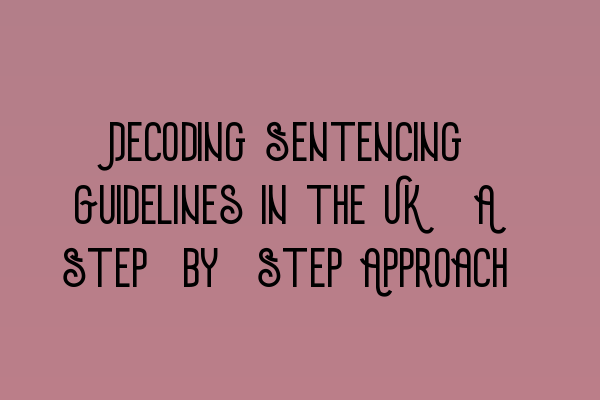Decoding Sentencing Guidelines in the UK: A Step-by-Step Approach
When it comes to criminal law in the UK, understanding the intricacies of sentencing guidelines is crucial. Whether you’re a law student, a practicing solicitor, or simply have an interest in the criminal justice system, decoding these guidelines can be a daunting task. However, with a step-by-step approach, you’ll be able to navigate the complexities and gain a deeper understanding of how sentencing works in the UK.
Step 1: Getting Familiar with Sentencing Council
The Sentencing Council is an independent body responsible for developing sentencing guidelines in England and Wales. Familiarizing yourself with the work they do and the guidelines they provide is essential. By visiting their website, you can access comprehensive information on the different types of offenses and their corresponding sentences.
For aspiring solicitors, it’s crucial to have a thorough understanding of the Sentencing Council’s guidelines as they will form the basis of your advocacy in court.
For more information on how to prepare for the Solicitors Qualifying Examination, check out this SQE Exam Prep: Essential Study Materials for Aspiring Solicitors article.
Step 2: Categorizing Offenses
One of the primary functions of the Sentencing Council’s guidelines is to group offenses into categories. Offenses are divided into different levels of seriousness, ranging from Category 1 (the most serious) to Category 4 (the least serious).
Understanding the categorization of offenses is essential for both prosecutors and defense solicitors, as it helps determine the appropriate range of sentences for a particular offense.
Step 3: Analyzing Aggravating and Mitigating Factors
When it comes to sentencing, the court takes into account various factors that may either aggravate or mitigate the seriousness of an offense. Aggravating factors can include previous convictions, the use of violence, or the presence of vulnerable victims. On the other hand, mitigating factors may include a defendant’s background, remorse, or cooperation with authorities.
As a solicitor, it’s crucial to identify the relevant aggravating and mitigating factors in a case to present a persuasive argument for your client. Understanding the guidelines will help you navigate through these factors and advocate for a fair sentence.
Step 4: Consult Case Law
While the Sentencing Council’s guidelines provide a framework for sentencing, case law also plays a significant role in determining appropriate sentences. By referring to relevant criminal cases and their outcomes, you can gain insight into how the courts have approached sentencing in similar circumstances.
For more information on building strong cases and utilizing expert testimonies in UK courts, check out this Expert Testimonies in UK Courts: Building Strong Cases article.
Step 5: Applying the Guidelines to Your Case
Once you have a clear understanding of the Sentencing Council’s guidelines, the categorization of offenses, and the relevant aggravating and mitigating factors, you can begin applying this knowledge to your specific case. Analyzing how the guidelines align with the particular circumstances of your case will allow you to make informed decisions and develop a strong sentencing strategy.
If you’re an international lawyer preparing for the SQE exam, understanding the UK’s sentencing guidelines will be crucial. Check out this SQE Exam for International Lawyers: Challenges and Success Strategies article for more insights.
Step 6: Keeping Up with Updates
Sentencing guidelines are regularly updated to reflect changes in legislation, court judgments, and societal attitudes. As a solicitor, it’s important to stay up to date with these changes to ensure your clients receive the most accurate advice and representation.
By regularly checking the Sentencing Council’s website and staying informed about legal news and updates, you can stay ahead and provide the best possible service to your clients.
Conclusion
Decoding sentencing guidelines in the UK is an essential skill for any solicitor or legal professional involved in the criminal justice system. By following the step-by-step approach outlined in this article, you’ll be able to navigate through the complexities of sentencing and develop a deep understanding of how it works.
For more information on the Solicitors Qualifying Examination format and how to prepare for it, check out this Demystifying the Solicitors Qualifying Examination Format article.
Remember, the sentencing guidelines provided by the Sentencing Council are just the starting point. By combining your legal knowledge, case law analysis, and a thorough understanding of the guidelines, you can effectively advocate for fair and just sentences for your clients.
For entrepreneurs interested in forming an LLC in the UK, check out this LLC Formation Made Simple: Step-by-Step Guide for UK Entrepreneurs article.
